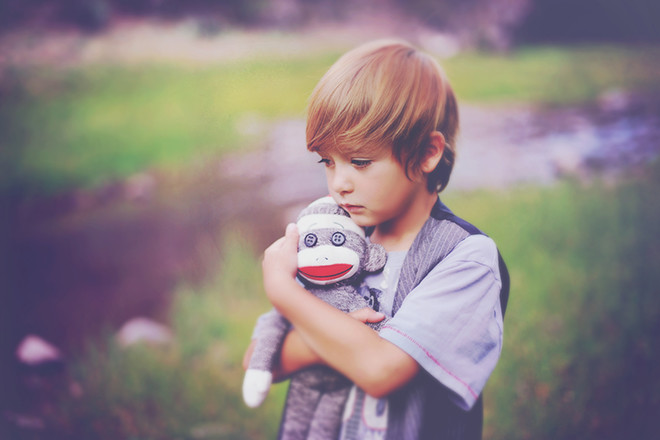Without mental health, there can be no healthas such. The World Health Organization announced that more than 450 million people on the planet suffer from certain mental illnesses and disorders. In the West, every seventh person has schizophrenia or is depressed or alcoholic. In Russia, about 25% of Russians suffer from mental disorders. How can you protect your child and help him grow resistant to stressful situations and not be depressed? Photo: Getty Images The psychology of children and adolescents is unstable and is in the making, so it is very important to try to protect their vulnerable mental health from negative effects.
Photo: Getty Images The psychology of children and adolescents is unstable and is in the making, so it is very important to try to protect their vulnerable mental health from negative effects.
- The family is of paramount importance. The child's psyche begins to be pawned during pregnancy. On what the situation will be around the future mother, on her emotional state depends on the health of the baby. After birth, the development of the psyche is affected by how much it feels comfortable and protected.
- Mental health deficit attention, as well as hyperope.
- An important role in the formation of the psyche is played by kindergartens. The state of his mental health depends on how good the contact between the child and the caregivers is.
- It is very important and how the child's relationship developswith peers. If your son or daughter does not manage to make friends, this can lead to internal conflict, which will cause emotional discomfort and inhibition in the formation of personality.
Love, understanding and patience to the child will help him in any situation, be it a problem or a grand event. Elena Nikolaeva, medical psychologist To maintain the child's mental health,it is important to be an attentive and caring parent: - Do not show excessive demands to your child. So study and sports instead of pleasure will bring only stress and anxiety. If a child brought a deuce from school, instead of scandals and sharp criticism, find a joint solution to the problem. This can be the help of both a tutor and a psychologist. - Communicate with the child on topics that are interesting to him. In addition, regardless of employment, every day, take an interest in relationships with friends, events in the kindergarten or school .- In no case should the spouses investigate the relationship in front of the child! - Limit the time the child conducts in front of the television and computer. Uncontrolled viewing of many programs and films negatively affects the emotional background and can provoke the development of fatigue and inadequate behavior.
To maintain the child's mental health,it is important to be an attentive and caring parent: - Do not show excessive demands to your child. So study and sports instead of pleasure will bring only stress and anxiety. If a child brought a deuce from school, instead of scandals and sharp criticism, find a joint solution to the problem. This can be the help of both a tutor and a psychologist. - Communicate with the child on topics that are interesting to him. In addition, regardless of employment, every day, take an interest in relationships with friends, events in the kindergarten or school .- In no case should the spouses investigate the relationship in front of the child! - Limit the time the child conducts in front of the television and computer. Uncontrolled viewing of many programs and films negatively affects the emotional background and can provoke the development of fatigue and inadequate behavior. Photo: Getty ImagesYelena Nikolaeva, medical psychologist
Photo: Getty ImagesYelena Nikolaeva, medical psychologist As a recipe for maintaining healthythe psyche, you can use the following. - Work. Work is the best medicine (both physical and mental, it is advisable to alternate). - Hobbies, communication, sports. Such activities return the fullness of sensations, give vigor, allow you to feel pleasant fatigue, return your ability to work. - Follow the daily routine (sleep, healthy eating). - Manage your emotions. The ability to manage anger and negative emotions is an important factor in good mental health and an indicator of your emotional intelligence. - Relax on time and with pleasure (sleep at least 7-8 hours, walk in the fresh air, travel, meet new people). - Eliminate bad habits as much as possible. - Find positive in every situation (whatever happens, everything is for the best). We learn to notice and enjoy the simplest things: good weather, the first spring flower, an evening with family. - Learn to smile. It is not so difficult to smile at a passerby who has asked you a question, a child on public transport, to greet your son, husband, friends with a smile. Without a doubt, even the most comfortable conditions do not guarantee that the physical and mental health of children will be ideal. Each child is unique in their own way, as is the structure of their psyche, so sometimes even in a complete and friendly family, children grow up unsure of themselves and in need of psychological help. It is important to identify mental health problems in children in time and protect them from undesirable consequences by participating, giving advice, and if necessary, seeking qualified help. The best way to prevent undesirable consequences is to constantly observe the child and record the manifestations of symptoms, as well as compare their actions with the behavior of their peers. Only by paying due attention and participating in their lives can you identify susceptibility to depression.
As a recipe for maintaining healthythe psyche, you can use the following. - Work. Work is the best medicine (both physical and mental, it is advisable to alternate). - Hobbies, communication, sports. Such activities return the fullness of sensations, give vigor, allow you to feel pleasant fatigue, return your ability to work. - Follow the daily routine (sleep, healthy eating). - Manage your emotions. The ability to manage anger and negative emotions is an important factor in good mental health and an indicator of your emotional intelligence. - Relax on time and with pleasure (sleep at least 7-8 hours, walk in the fresh air, travel, meet new people). - Eliminate bad habits as much as possible. - Find positive in every situation (whatever happens, everything is for the best). We learn to notice and enjoy the simplest things: good weather, the first spring flower, an evening with family. - Learn to smile. It is not so difficult to smile at a passerby who has asked you a question, a child on public transport, to greet your son, husband, friends with a smile. Without a doubt, even the most comfortable conditions do not guarantee that the physical and mental health of children will be ideal. Each child is unique in their own way, as is the structure of their psyche, so sometimes even in a complete and friendly family, children grow up unsure of themselves and in need of psychological help. It is important to identify mental health problems in children in time and protect them from undesirable consequences by participating, giving advice, and if necessary, seeking qualified help. The best way to prevent undesirable consequences is to constantly observe the child and record the manifestations of symptoms, as well as compare their actions with the behavior of their peers. Only by paying due attention and participating in their lives can you identify susceptibility to depression.









